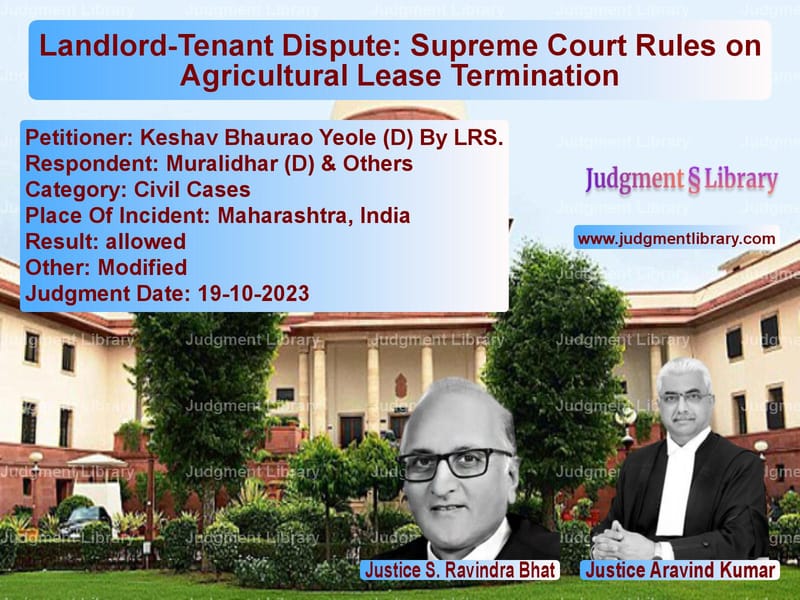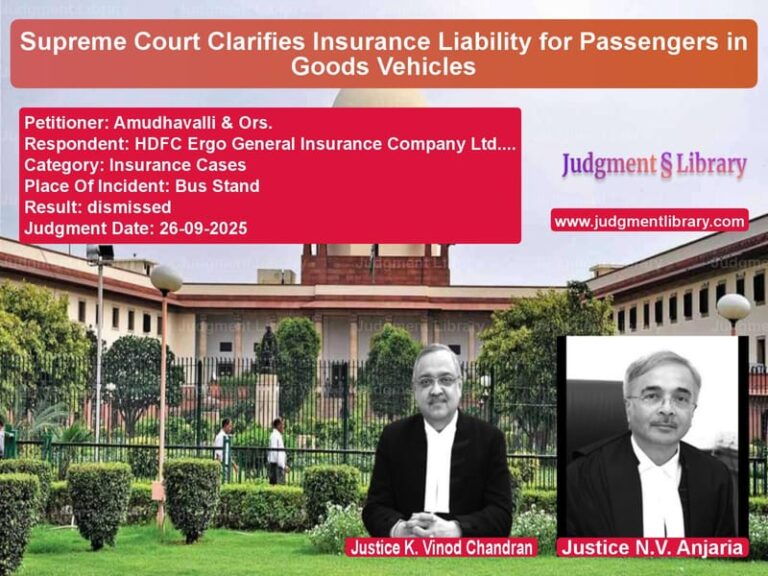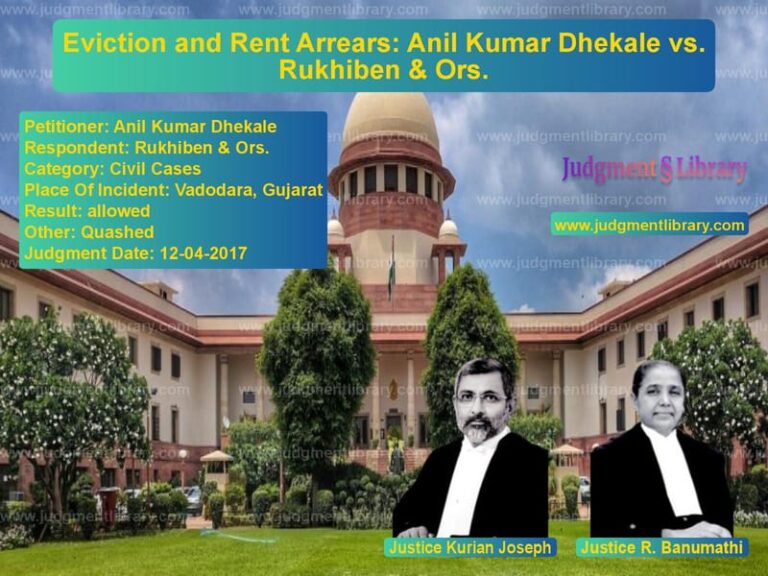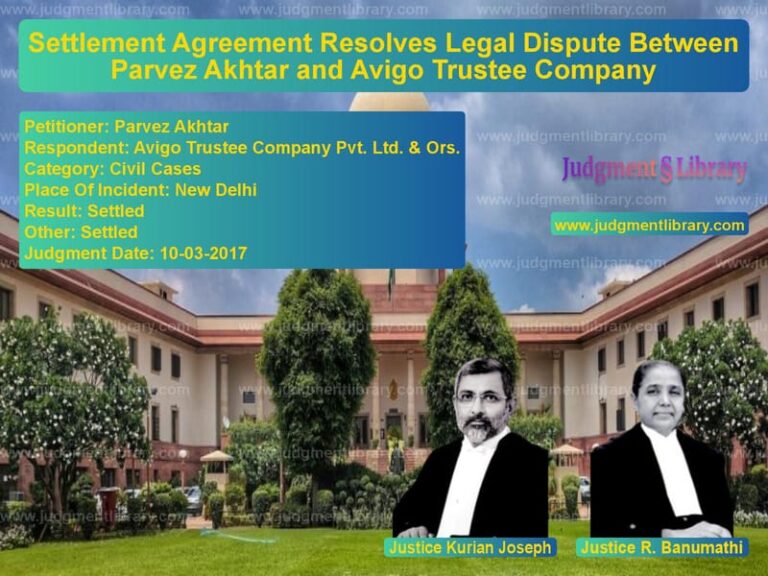Landlord-Tenant Dispute: Supreme Court Rules on Agricultural Lease Termination
The Supreme Court of India recently ruled in Keshav Bhaurao Yeole (D) By LRS. v. Muralidhar (D) & Others, a case involving the termination of tenancy and land resumption under the Bombay Tenancy and Agricultural Lands Act, 1948. The ruling clarified the conditions under which a landlord can reclaim leased agricultural land for personal cultivation.
Background of the Case
The case involved agricultural lands in Maharashtra. The original landlord, Keshav Bhaurao Yeole, had leased out land to tenants through two lease deeds dated August 30, 1962. The leased lands included:
- Survey No. 291 (26 acres 13 guntas) – Specifically for cultivating sugarcane.
- Survey No. 290/1 & 290/2 (8 acres 21 guntas) – For general cultivation.
When the lease term expired, the landlord issued a termination notice on September 5, 1975, seeking possession of Survey No. 291 for personal cultivation. No notice was issued for Survey No. 290/1 & 290/2. When the tenants refused to vacate, the landlord initiated proceedings before the Tenancy Awal Karkun under Section 29 read with Section 43A(1)(b) of the Act.
Legal Issues Raised
- Whether the landlord’s termination notice was valid and covered all leased lands.
- Whether the landlord had a bona fide requirement for personal cultivation.
- Whether the holding of the landlord exceeded one economic unit.
- Whether the revisional authority was justified in remanding the case.
Arguments by the Appellants (Landlord’s Legal Representatives)
- The landlord’s requirement for personal cultivation was genuine and supported by evidence.
- The Bombay Tenancy and Agricultural Lands Act permits resumption of land under Section 43A.
- The revisional authority miscalculated the landlord’s holding by including the tenanted lands, which were not in his possession.
- The High Court wrongly ordered a fresh determination of bona fide requirements due to the landlord’s death.
Arguments by the Respondents (Tenants)
- The termination notice only covered Survey No. 291, making any claim over Survey No. 290/1 & 290/2 invalid.
- The landlord’s holding exceeded the permissible economic limit, making him ineligible to reclaim the land.
- The revisional authority correctly ordered remand to determine whether the amended notification dated October 8, 1969, applied.
- The High Court correctly ruled that the landlord’s legal heirs must reestablish bona fide requirements for cultivation.
Supreme Court’s Observations
The Supreme Court analyzed the relevant provisions of the Act, particularly:
- Section 31 – Allows a landlord to terminate tenancy for personal cultivation.
- Section 31A – Specifies conditions such as economic holding and livelihood dependency.
- Section 43A – Exempts sugarcane leases from certain tenancy protections.
- Section 33B – Governs land resumption based on the equal distribution principle.
The Court found that:
- The termination notice only applied to Survey No. 291, making resumption of Survey No. 290/1 & 290/2 legally unsustainable.
- The landlord’s total holding was 13 acres, below the economic ceiling of 16 acres, making him eligible for land resumption.
- The revisional authority wrongly included tenanted lands in the landlord’s holding, leading to an incorrect conclusion.
- The High Court erred in requiring legal heirs to prove bona fide requirements afresh, as the crucial date for determination was the date of filing.
The Court referred to previous rulings, including:
- Gaya Prasad v. Pradeep Srivastava (2001) – Established that bona fide requirements must be assessed at the time of filing.
- Devidas Narayan More v. Chunnilal Bhailal Wani (1973) – Interpreted Section 33B’s equal distribution principle.
- Maruti Namdeo Gade v. Dattatraya Maval (1976) – Held that legal heirs must reestablish bona fide requirements only in certain circumstances.
Final Judgment
The Supreme Court allowed the appeal, set aside the High Court’s remand order, and ruled that:
- The landlord’s heirs were entitled to 8.34 acres in Survey No. 291.
- The Tehsildar must hand over possession within three months.
- The landlord’s heirs could pursue separate claims for Survey No. 290/1 & 290/2 through fresh proceedings.
Implications of the Judgment
The Supreme Court’s ruling sets an important precedent:
- Clear notice requirements – Landlords must issue separate termination notices for each leased plot.
- Proper landholding calculation – Only land in actual possession should be considered when applying economic holding limits.
- Bona fide requirement determination – Assessed at the time of filing, not at later stages due to subsequent events.
- Tenancy laws must be followed – Courts must strictly adhere to procedural requirements in agricultural lease disputes.
The Supreme Court’s decision strengthens protections for landlords while ensuring fair application of tenancy laws.
Petitioner Name: Keshav Bhaurao Yeole (D) By LRS..Respondent Name: Muralidhar (D) & Others.Judgment By: Justice S. Ravindra Bhat, Justice Aravind Kumar.Place Of Incident: Maharashtra, India.Judgment Date: 19-10-2023.
Don’t miss out on the full details! Download the complete judgment in PDF format below and gain valuable insights instantly!
Download Judgment: keshav-bhaurao-yeole-vs-muralidhar-(d)-&-oth-supreme-court-of-india-judgment-dated-19-10-2023.pdf
Directly Download Judgment: Directly download this Judgment
See all petitions in Landlord-Tenant Disputes
See all petitions in Property Disputes
See all petitions in Succession and Wills
See all petitions in Judgment by S Ravindra Bhat
See all petitions in Judgment by Aravind Kumar
See all petitions in allowed
See all petitions in Modified
See all petitions in supreme court of India judgments October 2023
See all petitions in 2023 judgments
See all posts in Civil Cases Category
See all allowed petitions in Civil Cases Category
See all Dismissed petitions in Civil Cases Category
See all partially allowed petitions in Civil Cases Category







